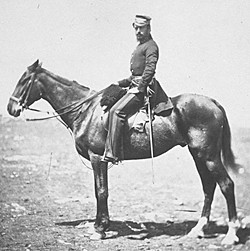The son of a local estate owner spent his life as a serving soldier, achieving high rank and at the age of 28, he also became one of the country's first recipients of our most conspicuous medal for bravery in the field, the Victoria Cross. Henry Hugh Clifford was the third son of Hugh Charles Clifford, the 7th Baron Clifford, who was born at Irnham Hall, near Bourne, on 12 September 1826 and received his first commission as a second lieutenant in the Rifle Brigade, on 7 August 1846. He served in South Africa against the Gaikas under Sandili in the following year and then against the Boers until their submission at Weinberg on the Vaal river. On the outbreak of another Kaffir war in 1852 he again went to Africa, where he remained until November 1853. He also took part in the Crimean War when he was appointed aide-de-camp (ADC) to Sir George Brown, commanding the light division, being present at Alma and Inkerman, and it was during this battle that he was honoured for his gallantry for which he later received the Victoria Cross after a charge on 5th November 1854, killing one of the enemy with his sword, disabling another and saving the life of a soldier. In May 1855, he was appointed deputy assistant quartermaster-general, and remained in the Crimea until the conclusion of the war when he was promoted to the rank of brevet major, and received the medal and clasps for Alma, Inkerman, and Sebastopol, and from foreign governments the Legion of Honour and the 5th class of the Medjidie. On the outbreak of hostilities in China, Henry Clifford joined the British forces as assistant quartermaster-general and was present at the operations between December 1857 and January 1858 which resulted in the capture of Canton. For his services he received the brevet of lieutenant-colonel, with the China medal and Canton clasp. On his return to England he commenced a long term of service on the staff, being appointed assistant quartermaster-general at Aldershot 1860-4 and then held a similar appointment at headquarters 1865-1868. He was also ADC to the commander-in-chief 1870-3 and assistant adjutant-general at headquarters 1873-5. During the Anglo-Zulu war in 1879, Clifford was sent to South Africa to take charge of communications for Lord Chelmsford between Durban and the forces in the field. His task was no light one because great confusion prevailed at Durban, the port of disembarkation; but by his past experience in staff duties, his knowledge of the requirements of the supply of an army, and, above all, by his familiarity with Kaffir warfare and his indefatigable nature, he very soon reduced everything to order and his labours were fully acknowledged by Sir Garnet Wolseley. He was made a Companion of the Order of the Bath in 1869 and knighted in 1879, eventually serving as major-general of the eastern district of England from April to September 1882. Sir Henry died at Ugbrooke, near Chudleigh in Devon on 12th April 1883, aged 72, and was buried in the chapel at Ugbrooke House. In 1857, he had married Josephine Elizabeth, only child of Joseph Anstice of Madeley Wood, Shropshire, professor at King's College London, and their son became Sir Hugh Clifford. NOTE: The Victoria Cross was officially constituted by Queen Victoria on 29th January 1856 but the order was backdated to 1854 to recognise acts of valour during the Crimean War and this included Henry Clifford. The first awards ceremony was held on 26 June 1857, where Queen Victoria invested 62 of the 111 Crimean recipients during a ceremony in Hyde Park.
Go to: Main Index Villages Index |
